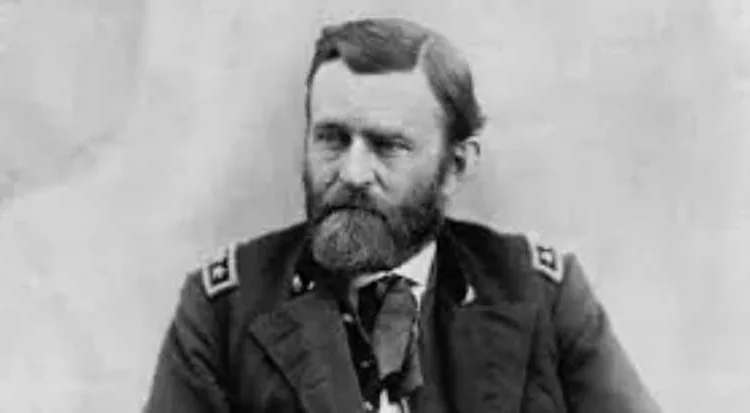U.S. Grant Against Inflation
How the Civil War hero tried to curb rampant government spending.

|
Getting your Trinity Audio player ready...
|
[Want even more content from FPM? Sign up for FPM+ to unlock exclusive series, virtual town-halls with our authors, and more—now for just $3.99/month. Click here to sign up.]
The victorious Civil War General Ulysses S. Grant was the Republicans’ unanimous choice for president in 1868. As in so many other presidential campaigns, the Democrats made race the centerpiece of their appeal to the American people. They nominated former New York governor Horatio Seymour and ran him on a platform calling for the “immediate restoration of all States to their rights in the Union under the Constitution,” amnesty for all former Confederates, and “the regulation of the elective franchise in the States by their citizens.”
That last point meant the right of white Southerners, chiefly former slaveholders and all Democrats, to restrict the freed slaves’ right to vote. For good measure, the Democratic platform called the Reconstruction Acts “unconstitutional, revolutionary, and void.” A Seymour campaign badge proclaimed, “Our Motto: This is a White Man’s Country; Let White Men Rule.” Grant won handily, with 214 electoral votes to Seymour’s 80.
The renowned general’s only problem after that was having to govern. During the Civil War, the U.S. government had printed paper money, backed by neither gold nor silver, to cover its rapidly rising war debts. Grant attempted to curb inflation and restore some fiscal responsibility to the economy by phasing out the greenbacks and conducting the government’s business in gold coins. He also maintained high tariffs to protect American workers and industries.
The new president also had to deal with self-serving advisors. Railroad magnate Jay Gould and stockbroker Jim Fisk had personally exhorted Grant to take this course, and were poised to take advantage. They bribed Assistant U.S. Treasurer Daniel Butterfield for inside information and proceeded to try to corner the gold market. In September 1869, Grant discovered their scheme and ordered his secretary of the treasury, George S. Boutwell, to sell $4 million in gold ($75 million today). This broke the power of the Gould/Fisk “Gold Ring,” but it also caused the first Black Friday, an economic downtown that lasted into 1870. Grant, moreover, was accused of knowing about the Gold Ring’s scheme, and even of being part of it.
Another scandal came in 1872, when stockholders of the Union Pacific Railroad, which had been given government money to build a railroad line to the West Coast, gave the contract for construction of the railroad to another company they owned, Crédit Mobilier of America. This enabled them to control the entire construction process, and without outside observers seeing what was going on, they submitted massively inflated bills for the construction and pocketed the profits. Grant himself was not involved, but several Grant administration officials, including Vice President Schuyler Colfax, were implicated in this scheme, and the image of the administration was again tarnished.
The Panic of 1873 brought more economic trouble, which Congress hoped to cure, in Bidenesque fashion, simply by printing more money. But Grant held the line, vetoing the 1874 Inflation Bill, which would have mandated the printing of millions of greenbacks. Grant reasoned that the inflation would do the economy more harm than good in the long run, and he set the country on course to return to the gold standard; paper money would be promissory notes for various amounts of gold, not simply paper backed only by the good faith of the U.S. government.
President Grant was right in this, but he could not escape the impression of corrupt financial dealings. Even if he wasn’t personally involved, his detractors argued, he was too lenient with his corrupt associates, of whom there were many. In 1875, Orville Babcock, his private secretary, was accused of being part of the “Whiskey Ring,” the members of which were siphoning the revenues of whiskey taxes to their personal coffers. Secretary of the Treasury Benjamin Bristow confronted Grant with evidence of Babcock’s guilt, but Grant refused to be convinced and even submitted a deposition at Babcock’s trial. His friend was acquitted.
Accusations of cronyism and corruption intensified. Yet Grant maintained that he was in favor of the prosecution of the members of the Whiskey Ring. Throughout his presidency, despite numerous accusations, he was never found to have been fattening himself at the public trough. His besetting sin was a poor choice of subordinates. They effectively prevented him from dealing effectively with the wholesale printing of paper money and the resulting inflation. Many future presidents would also face this problem, with some, like Old Joe Biden, actively encouraging it, rather than trying to put an end to it. Perhaps if Grant had been more successful, this oft-repeated error would not still plague us.

